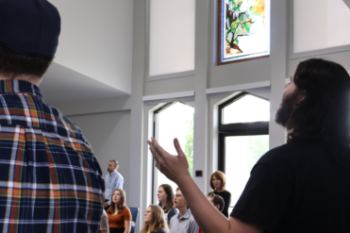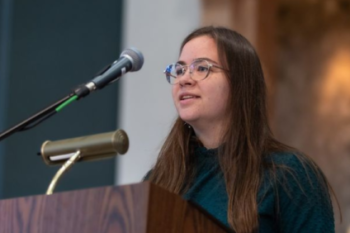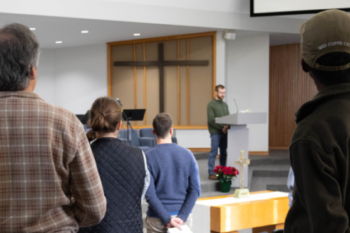Adorned with Joy: Easter and the Early Church
The celebration of the death and resurrection of Christ is the oldest feast in the faith. It was, and continues to be, the center point of the Christian faith. Just like in the New Testament Scriptures, early Christian writers took every opportunity they had to speak about Christ’s incarnation, death, and resurrection.
One theme that runs through early Christian sermons given at the celebration of Easter, or Pascha, is that it is treated as an occasion to re-tell the story of the faith. Often, as in the case of Melito of Sardis’ On Pascha, the narrative is told with a focus on just how horrible the world has become after Adam and Eve were expelled from the garden. After finishing his narration, Melito says:
“For the human being was being divided by death;
for a strange disaster and captivity were enclosing humanity,
and the human being was dragged off a prisoner under the shadows of death,
and desolate lay the Father’s image.” (On Pascha 56, with modifications)
It’s as though Melito is crying out, “Would you just look at the state of things!” The celebration of the death and resurrection of Christ begins by reminding those listening why it even happened in the first place. Something went wrong in the world, things are bad, and this sermon is starting off as a major downer.
The season leading toward Easter is itself a bit of a downer as well. Ash Wednesday reminds us “Hey! You’re going to die!” and Lent takes us with Christ into the wilderness to come face to face with thirst, hunger, and our own mortality. We get a bit of joy on Palm Sunday, but after that the celebrations grow more somber, the mood darkens, and the events become deadly.
Early Pascha celebrations retold the theological history of the world because it is the history in which God consistently acted. Though humanity, as Melito observed, was being dragged away as a prisoner, God intervened and through the incarnation brought humanity through death and into life. This is, in part, why the season of Easter was one of baptism and Christian initiation.
Early Pascha celebrations retold the theological history of the world because it is the history in which God consistently acted.
Celebrating the baptism of new Christians as part of the Easter celebration continues today in many traditions around the world. The season of the Great Fast, or Lent, was historically a time of preparation for these new Christian initiates. Cyril of Jerusalem delivered at least eighteen lectures to these catechumens at the Church of the Holy Sepulcher in the mid-fourth century. In these lectures, Cyril sits before these catechumens and declares, “Look at the state of things in your life!” In his prefatory lecture he says:
“Great is the baptism being set before you. It is a release to prisoners, the forgiveness of sins, the death of sin, the regeneration of the soul, the putting on of the garment of light, the indestructible holy seal, the chariot to heaven, the luxurious food of paradise, the gaining of the kingdom, and the grace of divine adoption” (Procatechesis 16).
Weeks of teaching, fasting, and prayer culminated in baptism. Clothed with new robes and the seal of the Holy Spirit, these new Christians partook of their first Eucharist and joined in with the celebration of Christ’s resurrection. It was the beginning of their new lives as they joined in the renewal of the world. Fourth century theologian Gregory Nazianzus says, “a few drops of blood recreate the whole world and become for all human beings like a curdling agent for milk, binding and drawing us together into one” (Oration 45.9, p. 189). Christ’s passion is an end to humanity’s captivity to sin and the beginning of the remaking of the world. As baptism is only the beginning of the Christian life, the feast of Pascha is only the beginning of the new creation.
The challenge of the Christian life has always been to look clearly at the state of the world and all that has gone wrong while somehow holding to the hope of resurrection and recreation.
This is one of the joys of the time between Easter and Pentecost. There is a new world in the making, and new lives to begin. Yet, the world is still as bleak as it was before. War, disease, death, and greed seem to be in charge—and that is nothing new. The challenge of the Christian life has always been to look clearly at the state of the world and all that has gone wrong while somehow holding to the hope of resurrection and recreation. For centuries Christians have wrestled with the current state of things and clung to the Easter hope of resurrection. They even started their Easter sermons with a grand litany of everything that is wrong and horrible.
Part of the challenge is to embrace this season with open arms and unadulterated joy without forgetting the state of things. This does not mean that the grief we bear in this life is dissolved. Instead, perhaps we can think of our bereft, despairing, and doubting hearts as being adorned with joy. Humanity has been made captive to sin, but by the blood of Christ, the world is being remade. The springtime celebration of Easter is a gift of remembrance, a time to remember our baptism, God’s fulfilled promise, and even the smallest fragments of hope. This, too, is the state of things, of things done and of things that are coming to be.
Instead, perhaps we can think of our bereft, despairing, and doubting hearts as being adorned with joy.
“Extend to us, blessed Lord,
a little of your richness
in the all-enriching month:
in April, your gift
has been spread out over all:
in it, enriched and adorned are
mountains with grasses,
furrows with seeds,
seas with goods,
dry land with possessions,
the heights with glimmering lights,
and valleys with blossoms.
April, adornment of the earth,
and April’s feast,
the adornment of the holy church.
[…]
April has broken
the chill of winter,
its bitter sting.
A symbol of love
is April, for its warmth
conquers the icy cold.
See how feet leap for joy
when it binds up winter;
see how hands are released
when it enchains idleness;
see how fruitfulness comes forth
when it adorns the earth.
Let the soul look and be envious
and instead of the earth
adorn itself!”
Ephrem the Syrian, On the Resurrection 4.1, 8
Alyssa Elliott is an alum of Emmanuel Christian Seminary at Milligan. View Emmanuel’s Academic Programs page here.





